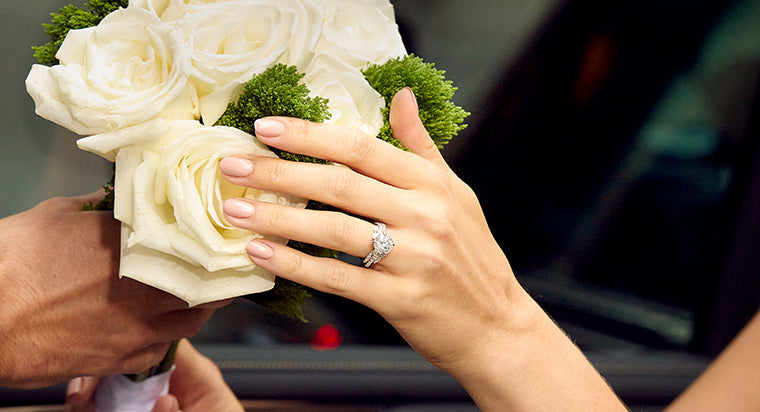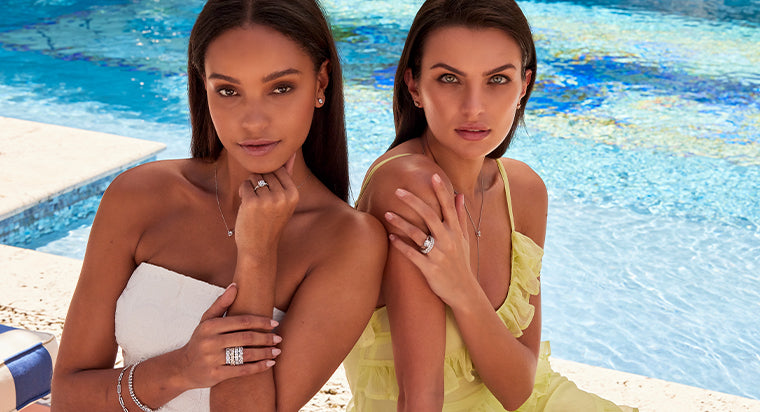Wedding Ring Metals and Skin Allergies: How to Avoid Them

Wedding rings hold a special place in our lives, symbolizing love, commitment, and the journey of two individuals coming together. The significance of these tiny yet powerful accessories can never be underestimated. However, the path to choosing the perfect wedding ring isn't always peachy perfect. Skin allergies, irritation, and discomfort caused by the metals in your ring can present a challenging and painful obstacle.
This guide will explore the world of wedding ring metals and how they can affect your skin. By the end, hopefully, you'll have the knowledge you need to make an informed choice that ensures both style and comfort on your special day.
TABLE OF CONTENTS
Common Wedding Ring Metals
When it comes to metal wedding rings, there's a vast array to choose from. Still, some of them are more common than others. Here's a snapshot of the most popular choices:
Gold: Gold metal wedding bands are timeless classics. While yellow gold is the most traditional, you can also choose white gold or rose gold. However, the color variation necessitates adding other metals to the alloy (which can cause an allergy issue). Nevertheless, gold is malleable and can be easily shaped into intricate designs for wedding bands for women, making it a top choice for custom rings.
Platinum: Platinum is prized for its strength and durability. Naturally white, it doesn't require rhodium plating like white gold. Its rarity adds to its appeal but can also increase the price. If you're searching for wedding bands for him, platinum is a strong choice that can keep up with his active lifestyle.
When choosing a wedding ring, we always recommend gold or platinum. It's a valuable piece of jewelry that will receive daily wear and tear, necessitating an investment in a strong and beautiful metal. However, other metals, including titanium, stainless steel, and silver, are available on the wider market. These metals tend to have various disadvantages that make them unsuitable for a wedding ring or engagement ring.
Each of the metals listed above has pros and cons, from cost to aesthetics to longevity. The key is finding the metal that matches your preferences and lifestyle.
Skin Allergies and Sensitivities
Skin allergies to jewelry, often called contact dermatitis, occur when certain metals react with the skin, causing irritation. Symptoms can range from redness and itching to blisters and rashes. These allergies can significantly impact your comfort, frequently making a piece of jewelry unwearable. If not treated, skin allergies can even lead to health concerns.
Allergenic MetalsNickel is one of the most notorious metals for causing an allergic reaction. It's commonly found in alloys (even gold) used for jewelry. In fact, white gold is usually made up of 75% gold mixed with 25% nickel and zinc. A white gold ring often has rhodium plating. However, the nickel inside can still trigger skin reactions in sensitive individuals if they're not careful. Some people are genetically predisposed to nickel allergies, while others develop them over time through repeated exposure.
Common sources of nickel exposure include jewelry, but belt buckles, zippers, and even some eyeglass frames can pose a threat to sensitive individuals. If you have a known nickel allergy, avoiding nickel-containing metals in your wedding ring is essential. Fortunately, many fine jewelers have switched to offering nickel-free jewelry to protect their customers.
Hypoallergenic MetalsIf you're prone to skin allergies, there's good news -- there are hypoallergenic metals that are less likely to cause skin irritations. These include pure gold, platinum, palladium, and hypoallergenic alloys. Pure gold and platinum, for instance, are inert and unlikely to trigger allergies. While less popular, palladium can be used as an alternative to white gold, and it's hypoallergenic.
Hypoallergenic alloys are specifically designed to minimize the risk of skin allergies. These alloys often replace nickel with metals like palladium, resulting in a safe and beautiful option for those with sensitivities.
Choosing the Right Metal for Your Wedding Ring
When choosing the right metal for your wedding ring, consider factors such as your budget, personal style, and lifestyle.
If you have known allergies or sensitivities, it's crucial to prioritize hypoallergenic metals. Usually, this means gold or platinum. Nevertheless, you'll still want to pick which metal meets your preferences and ensures your skin's well-being. Gold is classic and timeless, suiting most skin tones and acting as a perfect canvas for intricate details like in a custom-designed wedding ring.
Yellow gold and rose gold give off warm vibes that work well with vintage styles. White gold is of a cooler shade, but thanks to the nickel in its alloy, it may be troublesome for those with allergies.
Platinum truly is the best of the best when it comes to hypoallergenic metals. It's stunning, durable, and free from major allergens. Modern brides adore platinum for its icy hue that makes diamonds in diamond wedding rings look positively radiant. Because platinum is so strong, resizing or forming into complex designs can be tricky. Nevertheless, it's an extremely valuable metal that can contribute to making your wedding ring an heirloom piece.
Caring for Your Wedding Ring
Caring for your wedding ring is essential to prevent skin irritation. Regular cleaning can keep your ring looking its best and minimize the buildup of potential allergens. Remove your ring when engaging in activities that could damage or expose it to harsh chemicals, such as household cleaners.
Moisture can also accumulate under your ring, leading to skin issues. Make sure to dry your ring thoroughly after washing your hands or showering. In cases of severe allergies, you might consider taking periodic breaks from wearing your ring to relieve your skin.
Customization and Alternatives
Custom-made wedding rings are another excellent option, offering a unique and personalized approach to ensure you get the ring of your dreams without compromising your health. With Clarity offers a range of customization options, allowing you to choose the metal, design, and gemstones that suit your preferences and needs. The flexibility of building your ring from the ground up and choosing each aspect ensures that you don't have to settle for a ring that might trigger skin allergies.
There are alternatives for individuals with severe metal allergies – like silicone rings. These rings are flexible, comfortable, and, most importantly, hypoallergenic.
Which Metal will you Say "I do" to?
Selecting the right wedding ring metal is not just a matter of aesthetics but also of comfort and well-being. Understanding the properties of different metals, their potential to cause skin allergies and the availability of hypoallergenic options is key to making an informed decision. Prioritize your style, budget, and lifestyle while considering skin sensitivities. Whether you choose a traditional yellow gold band, a striking and modern platinum ring, or decide to venture into hypoallergenic alloys, your wedding ring should be a symbol of love and a source of enduring comfort, both physically and sentimentally.









